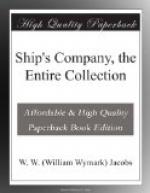“I must go,” said Mr. Kemp. “I’ve spent over eleven pounds cabling to-day; but it’s all no good.”
“But you’re coming back?” said Mr. Hills.
“O’ course I am,” was the reply. “George is the only relation I’ve got, and I’ve got to look after him, I suppose. After all, blood is thicker than water.”
“Hear, hear!” said Mrs. Bradshaw, piously.
“And there’s you and Bella,” continued Mr. Kemp; “two of the best that ever breathed.”
The ladies looked down.
“And Charlie Hills; I don’t know—I don’t know when I’ve took such a fancy to anybody as I have to ’im. If I was a young gal—a single young gal—he’s—the other half,” he said, slowly, as he paused—“just the one I should fancy. He’s a good-’arted, good-looking——”
“Draw it mild,” interrupted the blushing Mr. Hills as Mr. Wright bestowed a ferocious glance upon the speaker.
“Clever, lively young fellow,” concluded Mr. Kemp. “George!”
“Yes,” said Mr. Wright.
“I’m going now. I’ve got to catch the train for Southampton, but I don’t want you to come with me. I prefer to be alone. You stay here and cheer them up. Oh, and before I forget it, lend me a couple o’ pounds out o’ that fifty I gave you last night. I’ve given all my small change away.”
He looked up and met Mr. Wright’s eye; the latter, too affected to speak, took out the money and passed it over.
“We never know what may happen to us,” said the old man, solemnly, as he rose and buttoned his coat. “I’m an old man and I like to have things ship-shape. I’ve spent nearly the whole day with my lawyer, and if anything ’appens to my old carcass it won’t make any difference. I have left half my money to George; half of all I have is to be his.”
In the midst of an awed silence he went round and shook hands.
“The other half,” with his hand on the door—“the other half and my best gold watch and chain I have left to my dear young pal, Charlie Hills. Good-bye, Georgie!”
“Manners Makyth man”
The night-watchman appeared to be out of sorts. His movements were even slower than usual, and, when he sat, the soap-box seemed to be unable to give satisfaction. His face bore an expression of deep melancholy, but a smouldering gleam in his eye betokened feelings deeply moved.
“Play-acting I don’t hold with,” he burst out, with sudden ferocity. “Never did. I don’t say I ain’t been to a theayter once or twice in my life, but I always come away with the idea that anybody could act if they liked to try. It’s a kid’s game, a silly kid’s game, dressing up and pretending to be somebody else.”
He cut off a piece of tobacco and, stowing it in his left cheek, sat chewing, with his lack-lustre eyes fixed on the wharves across the river. The offensive antics of a lighterman in mid-stream, who nearly fell overboard in his efforts to attract his attention, he ignored.




